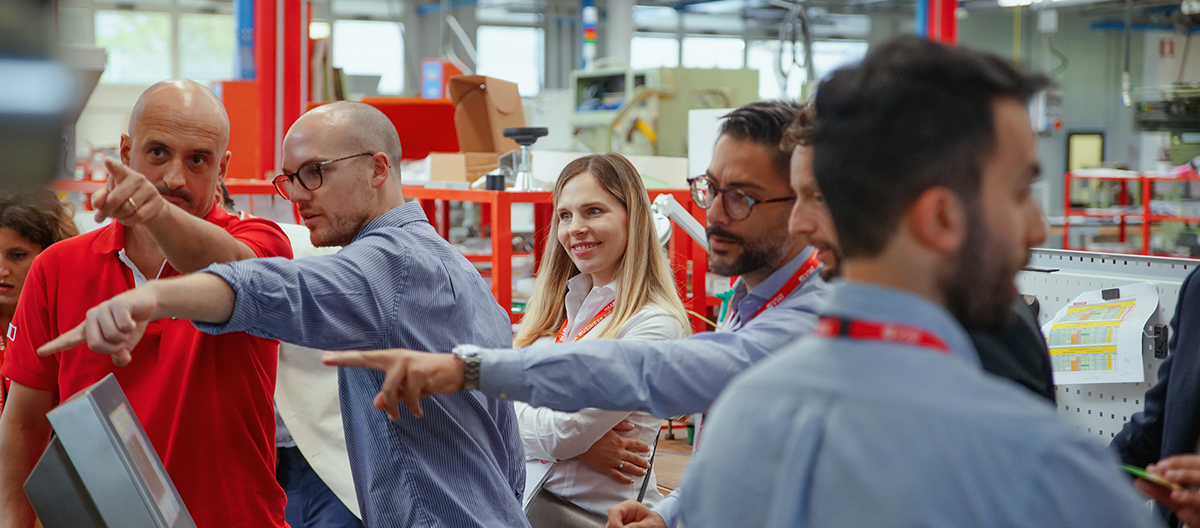
IMPROVING BUSINESS PERFORMANCE TO CREATE VALUE
The Executive Master in Supply Chain & Operations is designed for professionals in logistics, procurement, and production who aim to move into leadership roles in an increasingly digital and sustainable environment. The program builds strategic, managerial, and hands-on skills to manage the entire supply chain—from procurement to distribution—while integrating emerging technologies (AI, IoT, data analytics), agile models, and sustainability.
With a hybrid format—10 in-person sessions (on Fridays/Saturdays or Saturdays only) and weekly evening online classes—the Master allows participants to balance work, study, and personal life. The experience is enriched by Company Visits and talks with industry leaders, as well as a final Project Work based on real-world business cases.
Led by a faculty of academics and industry experts, the program equips future-ready managers to optimize business performance and create value, aligned with global trends in digital transformation, ESG, and risk management across the supply chain.
Book an interview with the course’s Directors to become the protagonist of a central function in the future of businesses.
THE MASTER IS AN INVESTMENT. THE LOAN IS THE WAY TO FUND IT.
Ranking
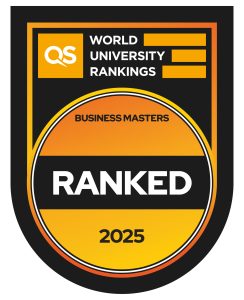
QS Quacquarelli Symonds is the international network focused on services, analysis and in-depth reports of post-experience and university education, geared toward international mobility and career development. The QS Online MBA Ranking is based on insights from the business world and a methodology that allows programs to be evaluated according to four parameters: Faculty and Teaching, Class Pro01t0800000AUd3xAADfile, Employability and Class Experience.
Accreditation

Bologna Business School is EQUIS – EFMD Quality Improvement System accredited, one of the most important international quality assessment and continuous improvement systems for Schools of Management and Business Administration.

Paolo Barbieri
Academic Director
p.barbieri@unibo.it
" Supply Chain and Operations are the backbone of an enterprise. Managing them effectively can provide an outstanding competitive boost, but it requires strategic vision skills and knowledge of the appropriate operational tools. In recent years, the profound transformation of the value system generated the need to renew the managerial skills of those who work in these corporate functions. The objective of the master is to train these profiles of excellence, helping them to value the role of Supply Chain and Operations like driving forces of the competitiveness of their enterprise. "

Pier Francesco Pinelli
Executive Director
pfpinelli@gmail.com
" Producing and then successfully selling both manufactured goods and commodities involves networks of connections, trade offs and increasingly complex decisions that go beyond the economic/competitive dimension and connect it with the company's risk profile, resilience and sustainability. Supply chain management is increasingly a topic of interest to CEOs: BBS's EMSCO master's programme aspires to prepare managers and professionals who are ready and able to successfully interact with the highest levels of business "
Structure
The Master is divided into 34 classroom days organized in 17 residential (Friday and Saturday, every two / three weeks) to which is added a day dedicated to the presentation of the final project work.
The Master consists of:
CORE COURSES
6 Core Courses concerning management themes about processing, restocking, transport, storage and distribution activities carried out in the companies. The fundamentals related to the various topics will be systematically and constantly discussed by featuring the structural changes occurring in the various activities following to the ongoing technological revolution called The Fourth Industrial Revolution, Industry 4.0; Moreover, there will be a focus on the study of interpretation and use of economic-financial data in decision-making processes and the knowledge and competencies useful to foster the development of leadership and people management skills;
DISTANCE LEARNING
30 weeks of distance learning on the e-learning platform: study of teaching materials, tutorials, discussion of case studies, and in-depth meetings with the tutor in evening elective sessions. m
FOCUS SESSIONS
5 seminars to explore specific topics that are strategic for those working in this field: Sustainable Supply Chain, Supply Chain Digital Transformation, Service Management, Change Management, Management of Complex Supplies and of Complex Supply Chain.
COMPANY VISIT
3 Company Visits, business visits dedicated to the field-analysis of operating and organizational solutions;
LEADER’S CORNER
8 meetings with prominent figures from the logistics and manufacturing field (5.30 – 7.30 pm): through the recounting of particularly relevant managerial experiences are intended to stimulate dialogue and reflection with respect to current and future professional challenges.
PROJECT WORK
Project work begins midway through the course and concludes the activities. This activity, which takes place in small groups, allows contextualization of the knowledge and tools acquired, and fosters networking. The project thus defined is a key benefit for both participants and companies.
COURSES
The course addresses the adoption of digital technologies in operations and supply chain management. They have radically changed both the operating conditions of companies and the competitive connotations, determining what has been called by many parties the “fourth industrial revolution.” Although the technological specificities will not be addressed, the essential elements will be provided to appreciate the effects determined by their application in situations where they have been integrated and have developed synergistic impact.
• The evolution of digital technologies
• Introduction of the leading technologies (IoT, BlockChain, Virtual Reality, Artificial Intelligence)
• The impact of new technologies: Industry 4.0
• The organizational changes imposed for their adoption
• Achievable results in terms of value creation
This module delves into logistics and physical material flow management in modern industrial and service industry production systems, through discussion and analysis of problems and technical and managerial solutions to support the manager. Special attention is given to the topics of packaging and wrapping, intra-logistics and automated material handling solutions, management of goods storage systems, and the configuration and management of distribution networks. Topics are declined and discussed with special attention to the issues of digitization and environmental sustainability. The approach is based on the intensive use of exercises, case studies and learning-by-doing.
- Packaging and packaging for logistics and physical material flow management
- Internal logistics and material handling systems: from traditional systems to flexible automated systems
- Principles and solutions for goods storage: from the choice of technological solutions to the configuration and management of warehouses, including picking warehouses.
- Strategic configuration and management of distribution network (inbound and outbound): principles of network design, location of intermediate and final distribution centers, and stock allocation policies.
The module after developing the theme of the current operating environment for manufacturing companies, proposes some of the main best practices in the design and management of manufacturing systems (both physical and information flow). It will also address the topic of continous improvement by presenting the main methodologies for managing improvement through lean manufacturing logics. The impact of digitization on the way manufacturing is organized will be addressed crosswise throughout the module. Finally, quality management from the perspective of integration into a modern manufacturing paradigm will be analyzed.
- Manufacturing in the modern industrial context and the role of digitization
- Efficient layout as a resource of competitive advantage
- Best practices in materials management (Plan for Every Parts) and Inventory Management Strategies
- Lean manufacturing and lean office
- Quality management in the new paradigm of integrated flexible manufacturing
People management is a fundamental variable within the world of supply chain and operations. The necessity of maintaining high productivity, continuously improving production processes and supporting the frequent changes of technology and of customers’ needs, cannot be done with unmotivated people. All the people managers in performing their task shall have, in their professional toolkit, instruments and techniques to make the most of people’s skills in an increasingly rapid and complex world.
- How people “work” – starting from neurosciences for a modern people management
- Leadership in times of uncertainty – starting from oneself to improve one’s influence
- Motivation of people and performance management – identifying motivations and successful skills
- Creating and leading an improvement and innovation team – finding the right people and maintaining the link
- The change management – using the change map to foster emotional traditions.
This module focuses on the management of suppliers and on the purchasing process.
The supply strategy will be analysed in terms of market analysis, development of a portfolio of suppliers and of management of the specific product category of purchase (number and typology of suppliers; methods to manage the relationship: collaborative vs. competitive; opportunities and risks when turning to global sourcing). The purchasing method is analysed in its fundamental stages, in particular focusing on methods and techniques for their streamlining. The module also features a wide overview on modern management tools of procurement (i.e. vendor rating advanced systems, risk management tools for purchases) and a specific in-depth analysis of international purchases, developed also through the analysis of real cases.
- Portfolio for the strategic management of suppliers: Kraljic matrix and recent approaches
- The stages of the purchasing process: detailed analysis and streamlining measures
- The partnership relationship with the supplier: methods, advantages and weaknesses
- Creating (and using) an advanced vendor rating system
- Risk-management for purchases
- International purchases in a changing world: global sourcing, re-shoring or “right-shoring”?
- Industry 4.0: impacts on the supply relationship.
Finotti Cristian
A correct layout of the Supply Chain and business Operations requires the skills to assess ex ante the economic and financial effects of the decisions that are taken and to check them ex post. The course adopts this perspective, providing participants with the management accounting tools aimed at understanding the budget of a current or prospective supplier, making assessments for business decisions, understanding the trade-off between discounts and deferments of payment in a commercial negotiation, assessing the Total Cost of Ownership of a supply. All these concepts will be illustrated by means of cases taken from real business applications.
- Economic analysis of the operating processes
- Total Cost of Ownership of the supplier
- Assessment of the financial impact of different layouts of the Supply Chain
- From the purchase cost to the Life Cycle Costing
- Economic-financial analysis of current or prospective suppliers: managerial techniques and assessments
- Value creation throughout the supply chain
After developing the decisions of competitive positioning of the company, the process of value creation for customer and the identification of critical success factors that shall orientate the supply chain and operations decisions will be analysed, highlighting the existing relationships between them and business strategic choices. When dealing with the topic of the “enlarged operating system”, both the impact of purchases on competitiveness and the policies that can be implemented for the creation and management of a supply chain consistent with the pursued strategy will be highlighted.
- The strategic positioning of the company and the identification of critical success factors
- The alignment between business strategy and production system
- Operations and Supply Chain as value generators
- Production strategies and multi-location
- The make or buy decisions: vertical integration or production decentralization
- The supply chain strategy: orientation towards efficiency or responsiveness
Zanoni Andrea
Businesses increasingly recognize that the customer starts the consumer experience when they interact with all the physical elements involved in the experience, not just the purchase phase. Today, we know that the physical and digital environments play multiple roles in the customer experience: they modulate the degree of customer autonomy during the consumer experience and shape the relationships between the customer and employees. Increasingly, the physical and digital environments can influence clients’ cognitive reactions (e.g., orientation capacity), affective reactions (e.g., pleasure), and behavioral reactions (e.g., the desire to stay or move away). The course addresses these issues by providing participants with solid theoretical foundations on the effects of the consumer environment on individuals through several examples of how these principles can be translated into reality.
Orsingher ChiaraThe stringent regulations in the field of emissions and recycling and the widespread awareness of the need to reduce the impact that the production and development system has on the planet and on humanity, makes more and more contemporary talk about sustainability and Supply Chain Sustainable.
The purpose of this workshop is to analyze the production system and the entire Supply Chain from the point of view of potential impacts on the environment and society and to present methods and tools for the analysis of sustainability and for the identification of the best Trade-off between efficiency and environmental sustainability, if in contrast, as well as enhancing any synergistic elements between these two drivers.
Mora CristinaThe introduction of new organizational designs and the adoption of digital technologies require processes of change that must be structured. In both cases it is a complex path that has a strong impact on established rules and habits and with respect to which people show resistance to change. To overcome these resistances, processes are activated that, starting from the definition of objectives and long-term strategies, are declined into actions that must be planned and controlled.
Brandalesi Marco
The main focus of the course is on complex supply chains with an overview of examples on the case of semiconductors, rare earths, and their increasing impact in legacy industries such as automotive. The course, addresses how new technologies impact traditional manufacturing chains. Case studies and real-world examples are provided to understand production complexities, unexpected lead times, market-imposed range changes, and risk mitigation strategies, helping to form a picture of the challenges that traditional industries will be expected to face as technology advances.
Bussi
Learning approach
Each course starts within a residential session and usually takes a half day spent in class. The teacher gives an introductory lesson, assesses the level of expertise of participants, describes the goals and contents of the module as well as the best methods to use the material included in the platform.
During the following weeks, the participants will continue the course interacting with the e-learning platform. Therefore, learning has a linear path, continuously monitored by the tutor, who is always open to explanations and further discussions. The plan provides for about 8 hours of individual study per week.
Over the weeks dedicated to each course, two residential one-day meetings are held. They focus on explanations and discussions of the topics of the ongoing course. Therefore, this model of course allows a repeated alternation of individual study with classroom lessons, which we deem particularly useful for learning.
The Master’s Course features 6 tests to assess the learning level.
Faculty
Faculty members at Bologna Business School work together offering outstanding teaching standards. An international and interdisciplinary approach is guaranteed by a joint team of distinguished national core professors, adjunct, visiting professors, guest speakers and top managers.
-
Paolo Barbieri
Associate Professor of Business and Management Engineering
University of Bologna
-
Marco Brandalesi
Principal
Bonfiglioli Consulting
-
Marco Bussi
Business Development Executive
Viavi Solutions
-
Giovanni Contino
Chief Executive Officer & Senior Consultant
Contino & Partners
-
Cristian Finotti
Global Chief Procurement & Supply Chain Office
Amplifon
-
Massimiliano Ghini
Director
European Center for Team Emotional Intelligence
-
Riccardo Manzini
Full Professor of Industrial Mechanical Systems Engineering
University of Bologna
-
Cristina Mora
Associate Professor of Industrial Mechanical Systems
University of Bologna
-
Chiara Orsingher
Full Professor of Marketing
University of Bologna
-
Alberto Regattieri
Full Professor of Operations and Manufacturing Systems
University of Bologna
-
Franco Visani
Associate Professor of Business Administration
University of Bologna
-
Paolo Zanella
Director SCM
Landi Renzo
-
Andrea Zanoni
Full Professor of Business Administration
University of Bologna
CLASS PROFILE (2019 - 2022)
Age

Professional Background
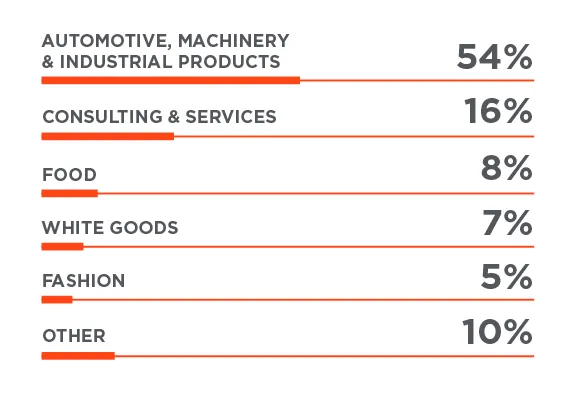
-
36
AVERAGE AGE
-
9 years
PROFESSIONAL EXPERIENCE
Alumni

Luna Ferrari
Motorsport After Sales Logistics and Purchasing, Lamborghini
EMSCO (ed. 2024/2025)
"The EMSCO Master at BBS was a valuable learning experience that allowed me to expand my skills and engage with highly accomplished professionals. I particularly appreciated the practical and strategic approach, which provided me with concrete tools to apply in my career. In addition to the knowledge gained, I am leaving with a network of extraordinary people and a broader perspective on the business world. I am truly glad I embarked on this journey, which, although challenging, turned out to be extremely rewarding."

Andrea Guerrini
Plant Manager, Rampini Carlo
EMSCO (ed. 2024/2025)
"EMSCO is a valuable professional development program in the fields of Supply Chain and Operations. Thanks to the preparation and professionalism of the instructors, the expertise and availability of the tutors, and the constant exchange of ideas and discussions with colleagues in the classroom, the Master strikes the right balance between theoretical training and more practical aspects that can be immediately applied in the daily work environment. The provided educational material helps to clearly understand the topics covered in the courses, while the suggested readings offer focused and effective in-depth knowledge. EMSCO also represents a unique opportunity for growth and improvement."

Greta Collovati
Production and Procurement Planning manager, Divisione di Calpeda Spa
EMSCO (ed. 2023/2024)
"Participating in EMSCO is an exciting life experience. In addition to being an investment in one's own professional growth, in an ideal and stimulating environment of course colleagues with the same interests and ambitions and highly professional lecturers, it also offers insights into personal growth. The experience and availability of the lecturers are elements that make the difference; at any time it is possible to exchange views and receive advice. The entire organisation of the master's course, from the team of organisers/teachers to the topics covered in the classroom, which can be used in everyday life, is tailored to the needs of the students. There is also the possibility of participating in company visits to see the application of the topics covered in class. Surely after a short time from the start of the master's course, one realises that the initial investment will be amply repaid Translated with DeepL.com (free version)"
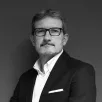
Antonio Manna
Supply Chain Director, MEP SpA
EMSCO (ed. 2023/2024)
"EMSCO is a significant opportunity for comparison, updating and growth in the panorama of professional training at management level. The various topics involving the entire Supply Chain are dealt with in detail and in depth from a strategic, financial and operational point of view. Thanks to the high professionalism of the lecturers and professionals combined with the comparison with colleagues in the classroom, this Master offers an excellent improvement path and an opportunity to learn the most important management tools with an orientation that is not only academic, but also concrete and practical"

Mirco Mucci
Materials Project Supervisor, Kerakoll
EMSCO (ed. 2022/2023)
"The master's program allows you to delve into different aspects in the field of supply chain with a more managerial slant and allows you to develop your background through a broader and more comprehensive view. An investment in oneself and one's professional growth, a stimulating and nourishing course in content that allows one to establish and improve one's professional relationships."

Elisa Esu
RPA Acquisti, Alten
EMSCO (ed. 2022/2023)
"EMSCO was the best investment I could have ever made! The master's program allowed me to interface with faculty and Supply Chain professionals, gaining new tools and knowledge both academic and practical. I thoroughly enjoyed the company visits and external testimonials. Definitely, such training will allow you to broaden your perspectives and boost your professional growth."

Matteo Subacchi
Quality & Continuous Improvement, Cobo
EMSCO (ed. 2021/2022)
"EMSCO is a path of professional and personal growth of the highest level that crosses the main issues concerning the world of Operations and Supply Chain perfectly contextualized in business realities. A team of faculty, professionals, and tutors allow you to be at the center of the program at any time, even during individual study weeks. The vital point is the testimonies made available directly by professionals who share their experiences in the "Leader's Corners.""

Alessandra Locci
Plant MPS, Revlon
EMSCO (ed. 2021/2022)
"EMSCO represents a significant investment in my career. Thanks to the experience and professionalism of the teachers and the wise organization of the master, I immediately felt guided in this growth. The path wraps around the core topics related to the supply chain and operations world. From the very first lessons the concepts studied have been translated into valuable tools for my professional life. "

Giordano Micucci
Tooling Buyer Europe, Röchling Automotive
EMSCO (ed. 2021/2022)
"EMSCO is an enveloping experience: an intelligently structured path has guided us through courses held by the best Italian teachers and professionals (together with the highest level tutorship) to a new degree of understanding of the national and international supply chain's logic. The Master is a powerful aggregation tool and a unique opportunity to network among young professionals who want to contribute to the improvement of their organizations and accelerate their growth path."

Antonio Lamparella
Production Planning Specialist, FAAC Simply Automatic
EMSCO (ed. 2020/2021)
"Participating in EMSCO means investing in yourself. The master course has been characterized by a mix of lessons carried out at 360 degrees. It was a unique experience; it took a lot of effort to bring it to an end, but I’d do it again tomorrow. The added value was meeting high-level professors and creating a very interesting network of contacts with professionals in the sector that I will benefit in the future."

Francesco Murziani Fuchs
Site Manager, BaderOya Oilfield Service Company
EMSCO (ed. 2020/2021)
"Master with high content; teachers-professionals super prepared, able to capture the attention of the classroom even during the discussion of the most complex issues. Thanks to them and to the companions of "travel" I had the opportunity to confront myself with sophisticated instruments never before faced, in a very stimulating context. Going back to the classroom made me realize that studying is fundamental and that despite the work you can do with profit and satisfaction, learning to give the best."

Veronica Regalli
Shipping Agent, Sidel Group
EMSCO (ed. 2020/2021)
"The Master and the school surround your life, not only the professional one, but also the everyday one. They take you by the hand and take you out of your comfort zone, where incredible things can happen. They take you on a new path, and you start to realize, that you’ve never considered certain aspects of things, that you’ve never considered certain nuances, that if they first seemed insignificant to you, then they start to weigh in on your decisions. "
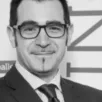
Matteo Pirisi
Supply Chain & Logistics Director, I.C.R. Industrie Cosmetiche Riunite
EMSCO (ed. 2020/2021)
"The EMSCO Master, in addition to being a confirmation of the best techniques and methods already learned in the field, has proved a valuable evolution supported by the best practices. The faculty, tutors and professionals involved in the training process are the real winning factor of this path."

Maria Pia Montagna
Industrial and Business Controller, International Paper
EMSCO (ed. 2020/2021)
"Participating in the EMSCO Master means opening a window on the world of Operations and the Supply Chain to have a 360 º view not only on the techniques and principles related to these areas, but to approach them with the eyes of change and innovation, with the perspective of those who always ask why and want to know, improve and solve. A strong motivation is needed to combine work and personal commitments with study, but it is worth it. Breadth of thought, diversity, focused, tenacious and innovative approach: these are the main things that I will put in my luggage at the end of this journey."

Luana Vetere
Planning & Logistic Coordinator, Dallara
EMSCO (ed. 2019/2020)
"The Master grants you an all-round experience: a competent faculty, fellow participants from a variety of businesses and important guests contribute to create a new, fascinating picture, in which you feel you want to and can participate as a protagonist: the buzzword here is innovation!"

Alessandro Bernabei
Plant Manager, Bucchi
EMSCO (ed. 2019/2020)
"The Master gave me new vantage points, concrete applications, perspective and overview. The course focused on the Supply Chain and Operations as a whole, and now we have acquired integrated and efficient tools for the challenges that await us."

Letizia Smillovich
Logistics Methods Engineer, Pietro Beretta
EMSCO (ed. 2017/2018)
"Network, versatility, professional growth, teamwork: these are just some of the attributes I feel I can associate with this experience. The continuous comparison with teachers and professionals has developed in me professional and human stimuli, as well as the opportunity to look to the future with a different perspective. Commitment is required, time becomes a very precious scarce resource and it is necessary to find the balance between study and work in a short time. However, do not worry: a constant and motivated commitment is rewarded with highly gratifying work and personal results."

Matteo Palmieri
Production-Assembly Area Manager, Electrolux
EMSCO (ed. 2017/2018)
"Participation in this Master was an intense and rewarding experience. The purely academic lectures were cleverly alternated with testimonies of the highest professional profile and strong experiential value, thus transferring both theoretical and applicative skills. I conclude this path aware of having widened the horizon of my knowledge and of my chances of professional growth, and above all, knowing that I am part of a group of fantastic people with whom we have shared efforts and ideas, with which I am sure we will continue to have friendships and mutual support."

Eleonora Marongiu
Supply Chain Project Manager, Magneti Marelli
EMSCO (ed. 2017/2018)
"The Masters in Supply Chain & Operations at BBS is first of all a great opportunity that you can give yourself. The professional comparison with colleagues, teachers and companies allows you to absorb new ideas and open your mind to different realities. It is a step away from your daily life that teaches you to observe the business context and the world of the Supply Chain with a closer and prepared look ."

Alessandro Barzan
Process and Product Development Manager, Italcab
EMSCO (ed. 2017/2018)
"Participating in this master is like climbing high altitude: the journey allows you to acquire an overview and to grasp new horizons. It is definitely an opportunity for great personal growth: from the confrontation with fellow travelers, teachers and professionals who come together are born stimuli and ideas that lead to new questions and to broaden your mind. You then return to the ground with new skills to see and navigate, with tools, questions, ideas and charge to build new paths for improvement for yourself, for others and for your company."
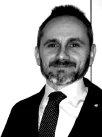
Simone Tosi
Plant Director, Glem Gas
EMSCO (ed. 2016/2017)
"The pursuit of improving my professional performance, led me to face the Master in Supply Chain & Operations with BBS. The added value that I most appreciated is the mix between the academic path and the testimony of practitioners from various sectors who contextualized the theoretical part of reality, which was really different from each other. This helped me to drop the tools seen at the Master in my business reality."

Simone Marchiotto
Logistics / Site Manager, Panalpina Trasporti Mondiali
EMSCO (ed. 2016/2017)
"Why participate in an executive master? It's like making more light. It improves the vision, you see new details, other shades. Professional and human experiences to compare, new ideas and tools of action. To question consolidated behaviors that do not yield more results. Learn techniques to experience different approaches."
Networking
The Executive Master’s Course in Supply Chain and Operations is made up of people, providing both formal and informal dialogue opportunities, to foster the exchange of ideas and experiences among participants. The networking develops among the students of the same class, between participants and teachers, as well as with students of other courses and with the School community.
In Company
The direct contact with managers and protagonists of relevant business situations in their working environment is a great learning and networking opportunity. The 3 business visits allow participants to meet managers or entrepreneurs representing models of excellence in the area.
In-company sessions in first edition were held at the following companies:
- Toyota Material Handling
- Marchesini Group
- Comer Industries
- Philip Morris
- Technogym
- Bonfiglioli Riduttori
- Lamborghini
- Electrolux
- Schneider Electric
- Davines
- GEA Mechanical Equipment
Leader’s Corner
The Executive Master’s Course in Supply Chain and Operations features a continual discussion among participants and the relevant figures of logistics and production, through the dialogue and the narrative of particularly significant personal business experiences. These meetings have a double goal: opening a direct exchange of excellent direct experiences and fostering reflections on one’s own managerial experience.
Key Speakers:
- Bruno Mussini, Faber
- Paolo Zanella, Landi Renzo
- Gianpaolo Fedrigo, Coveme
- Gianfranco Giorgni, Ducati
- Francesco Scida, Lamborghini
- Fabrizio Sasdelli, Cima
- Marco Manfredini, Arcese
- Francesco Montanari, Datalogic
- Donato Marra, Arkimat
- Gianpaolo Fedrigo, Coveme
- Gianmarco Biagi, Luxury living Group
- Davide Di Marzo, Bossard
- Francesco Milicia, Ducati
- Enrico Vita, Amplifon
- Carlo Serpentino, Philip Morris International
- Cristiano Trenchi, Lidl
- Claudio Ferrozzi, GEA Consulenti di Direzione
- Marco Brandalesi, Bonfiglioli Consulting
- Umberto Mirani, Bonfiglioli Consulting
- Stefano Bennetti, Davines
- Giuseppe Pace, Exor International
- Fabrizio Santini, ADACI
- Federica Dallanoce, ADACI
- Leonardo Salcerini, Toyota Handling Material Italia
COMPANIES
The Executive Master’s Course in Supply Chain and Operations is the ideal path to develop management capabilities and leadership skills. Many companies choose it as a tool aimed at enhancing their key resources or directly by managers and entrepreneurs who have decided to invest personally in their future. Starting from the main issues and topics that companies highlighted during the design stage in their contexts, it was possible to focus on and understand needs and expectations concerning this advanced educational path.
The design meetings were attended by:
AEPI, Aeroporto Marconi, Assa Abloy, Baschieri & Pellagri, Bondioli & Pavesi Group, Camst, Datalogic, Ducati, Effer, Gruppo Hera, Lamborghini, Log.out.Lab, Laminam, Poste Italiane, Sacmi, Selcom Group, Simer, Soilmec – Gruppo Trevi, USCO Vimar
Programme Advisory Committee
- Andrea Costantini – Head Of Production, Lamborghini
- Giovanni Palopoli – Western Europe Operations Vice President, Barilla
- Giovanna Montani – Head of Sales, Gruber Logistics
- Stefano Cortiglioni – Vice President Operations Global Water Fluid Solutions, MANN+HUMMEL
- Andrea Bontempi – Partner, KMPG Advisory
- Eleonora Marongiu – Head of Purchasing, Selcom Group
- Valeria Rojas – Global Technology Change Lead, Philips Morris International
Community
Community and Career Development
During the Master, a series of seminars with head-hunters and HR managers are offered, to provide tools and resources to contribute to your career development and how to enter the job market in leadership positions.
Once the Master is ended, it is possible to join the activities dedicated to the Community, to further increase your own network. Furthermore, meetings open to the entire BBS Community are periodically scheduled with managers, entrepreneurs and guests, focusing on the different scenarios of a constantly evolving society and market.
FEES
The registration fee for the Master’s course on a company basis is 18.200 Euros + VAT.
The registration fee for the Master’s course on an individual basis is 15.200 Euros + VAT
The tuition fee includes:
- Access to Moodle platform and teaching material
- BBS Community events
- Wi-fi access
- Access to corporate budget databases
For further information, please contact emsco@bbs.unibo.it
Funding
Long-term and low-interest loan:
– Repayable in 10 years
– Reduced interest rate
– Possibility to postpone the 1st payment fee to 36 months
Companies that make investments in education 4.0 aimed at the acquisition or consolidation, by the company’s employees, of skills in the technologies relevant to the implementation of the process of technological and digital transformation can take advantage of the tax credit in 2022 provided by the “National Plan Enterprise 4.0”. For more information, click here .
INTERPROFESSIONAL FUNDS
Special reductions are available through participants own interprofessional funds:
Fonditalia: fonditalia.org
Fondimpresa – for middle management: fondimpresa.it
Fondo Dirigenti PMI – for managers of industrial SME: fondodirigentipmi.it
Fondirigenti – for directors: fondirigenti.it
Fon.Coop – for cooperative companies: foncoop.coop
Fondimpresa finances education for product’s and/or process’ technological innovation concerning its SMEs of the manufacturing sector. For further information click here.
REQUIREMENTS
The Master’s course is addressed to managers, professionals and consultants who work:
- in industrial companies that have or intend to have a critical success factor in the Supply Chain and in the Operations;
- in companies providing services for which operations represent one of the relevant activities to be presided over;
- in companies of the logistics field oriented to understanding their customers’ issues and needs.
Typically, participants are graduates with a few years of experience, although a limited number of non-graduated individuals with significant experience are also allowed to participate.
APPLICATION PROCESS
The selection process will be carried out by an entry test, analysing the applicants Curriculum Vitae and by way of an individual interview, aimed at identifying the applicant’s professional profile and the consistency with his/her participation in the Master’s course. In order to participate in the selections for the Master’s course, please send your Curriculum Vitae to emsco@bbs.unibo.it. Applicants will be contacted to arrange the entry test and the interview.
FAQs
The selection process consists of an interview with the Master’s Director, organised by the Program Manager upon candidate request and after sending of the Curriculum Vitae. The interview is not binding on enrollment.
The Program Manager can send a certificate of attendance record at the end of the didactic sessions to those that make a request, upon verification of the attendance.
In order to get admitted to the Master Executive, it is required to have a Bachelor’s Degree, however, a limited number of places are available for those who do not have a Bachelor’s Degree but that can demonstrate to have significant professional experience, to be evaluated during the assessment interview.
No, it is not. The Executive Masters are not University Masters, therefore they do not have ECTS credits (European Credit Transfer and Accumulation System), that in Italy are called “crediti formativi universitari (CFU).
At the end of the Master, a certificate of attendance (which includes the achieved results) and a Diploma of Participation (upon verification of successful completion of each course and of at least a 70% of class attendance) are issued.
No, because it is not a university Master.



